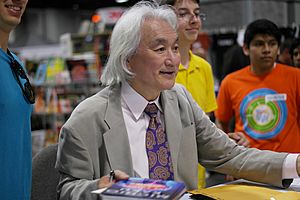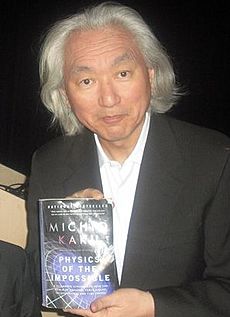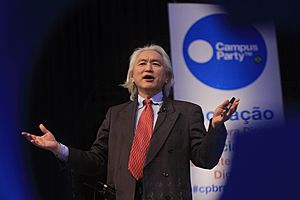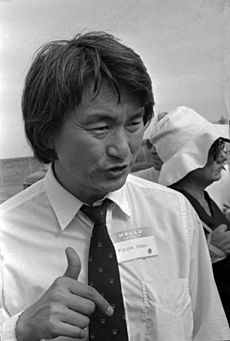Michio Kaku facts for kids
Quick facts for kids
Michio Kaku
|
|
|---|---|
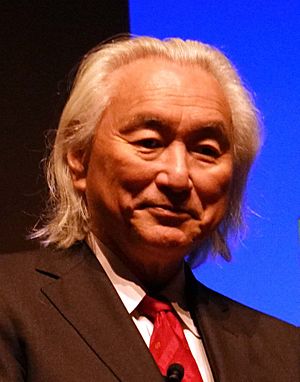
Kaku in 2020
|
|
| Born | January 24, 1947 San Jose, California, U.S.
|
| Education | Harvard University (BA) University of California, Berkeley (PhD) |
| Known for | Light-cone string field theory Physics of the Impossible Physics of the Future The Future of the Mind The God Equation |
| Spouse(s) | Shizue Kaku |
| Children | 2 |
| Awards |
|
| Scientific career | |
| Fields | Theoretical physics |
| Institutions | City College of New York New York University Princeton University Institute for Advanced Study |
| Thesis | Spin and Unitarity in Dual Resonance Models (1972) |
| Doctoral advisor | Stanley Mandelstam Robert Pound |
Michio Kaku (born January 24, 1947) is an American theoretical physicist, a person who explains science to the public, and a writer. He is a professor of theoretical physics at the City College of New York. Kaku has written many books about physics and related topics. He often appears on radio, television, and in films. He also writes for his own blog and other popular news sites. In 2021, he received the Sir Arthur Clarke Lifetime Achievement Award. This award recognized his work in connecting science with science fiction ideas.
His books, including Physics of the Impossible (2008), Physics of the Future (2011), The Future of the Mind (2014), and The God Equation (2021), all became bestsellers on The New York Times list. Kaku has hosted several TV shows for channels like the BBC, the Discovery Channel, the History Channel, and the Science Channel.
Contents
Early Life and Education
Kaku was born in 1947 in San Jose, California. His parents were both second-generation Japanese-Americans. This means their parents had moved to the U.S. from Japan. Kaku shared that his grandfather came to the United States after the 1906 San Francisco earthquake to help with the cleanup. Both of Kaku's parents were born in California.
During World War II, his parents were held in a special camp called the Tule Lake War Relocation Center. They met there, and Kaku's older brother was born in the camp.
Kaku said he decided to study physics after seeing a photo of Albert Einstein's desk. Einstein had been trying to finish his unified field theory, which is a way to explain all the forces of nature with one idea. Kaku was inspired to try and solve this theory himself.
For a high school science fair, Kaku built a small "atom smasher" in his parents' garage. This machine was powerful enough to create antimatter. At the science fair, he met physicist Edward Teller, who became his mentor. Teller helped Kaku get a special scholarship for engineering.
Kaku went to Harvard College and graduated with top honors in 1968. He was the best in his physics class. He then studied at the University of California, Berkeley, where he earned his PhD in 1972. After that, he taught at Princeton University.
In 1968, during the Vietnam War, Kaku joined the United States Army. He stayed in the Army until 1970. He completed his basic training in Georgia and advanced training in Washington. However, he was never sent to Vietnam.
Academic Career
From 1975 to 1977, Kaku worked on quantum mechanics research at the City College of New York. He also visited and worked at the Institute for Advanced Study in Princeton, New Jersey and New York University. As of 2024, he is a professor of theoretical physics at the City College of New York.
Between 1970 and 2000, Kaku published many papers in physics journals. These papers covered topics like superstring theory, supergravity, and supersymmetry. In 1974, Kaku and Professor Keiji Kikkawa wrote the first papers describing string theory in a field form.
Kaku has also written several textbooks about string theory and quantum field theory. He and Keiji Kikkawa also clearly described how to "quantize" the light-cone string.
Popular Science Work
Kaku is best known for making science, especially physics, easy for everyone to understand. He has written books and appeared on many TV shows and in films. He also hosts a weekly radio show.
Radio Shows
Kaku hosts a weekly radio show called Exploration. It is produced by the Pacifica Foundation's WBAI in New York. This show is shared with other community and independent radio stations. You can also listen to past episodes on the show's website. Kaku says the show covers science, war, peace, and the environment.
In April 2006, Kaku started another radio show called Science Fantastic. It was broadcast on 90 commercial radio stations in the U.S. Now, it reaches 130 radio stations and is on America's Talk on XM. It was the only science radio show that was broadcast across the country. When Kaku is busy filming for TV, Science Fantastic sometimes takes a break for a few months.
Kaku is also often a guest on other radio programs. For example, on November 30, 2007, he was a guest on Coast to Coast AM. On that show, he said he believes that life exists beyond Earth.
Television and Film Appearances
Kaku has appeared on many TV shows and networks. These include Good Morning America, Larry King Live, 60 Minutes, CNN, ABC News, CBS News, NBC News, Fox News Channel, The History Channel, The Science Channel, and The Discovery Channel.
In February 2006, Kaku was a presenter in a four-part BBC-TV show called Time. This show explored the nature of time.
On January 28, 2007, Kaku hosted the Discovery Channel series 2057. This three-hour program looked at how medicine, cities, and energy might change in the next 50 years.
In 2008, Kaku hosted the BBC-TV show Visions of the Future. This show was about the future of computers, medicine, and quantum physics. He also appeared in episodes of the History Channel's Universe and Ancient Aliens series.
On December 1, 2009, he started hosting a 12-episode TV series for the Science Channel. It was called Sci Fi Science: Physics of the Impossible, based on his book. Each episode explored the science behind imaginative ideas. These included time travel, parallel universes, and warp drive. The show featured interviews with scientists working on these technologies. It also included talks with science fiction fans and clips from relevant movies.
In January 2007, Kaku visited Oman. He spoke with important leaders there. In an interview, Kaku shared his ideas about the future of humans. He believes climate change and terrorism are big threats to human progress.
Public Advocacy and Activism
Kaku has spoken out about several important issues. He is concerned about people who deny that humans are causing global warming. He also worries about nuclear armament (building nuclear weapons) and the misuse of science. He criticized the Cassini–Huygens space probe. This probe carried a lot of plutonium for its power source. Kaku was worried about what would happen if the probe's fuel spread into the environment during a crash.
He has also talked about the dangers of space junk and asked for better ways to track it. Kaku strongly supports exploration of space. He believes that humans might one day live on planets outside our solar system. However, he has criticized some of NASA's missions that he feels are too expensive for what they achieve.
Kaku says his strong feelings against nuclear war came from listening to programs on the Pacifica Radio network when he was a student. During that time, he decided not to work on developing new nuclear weapons. Instead, he chose to focus on research, teaching, writing, and sharing science with the public.
Kaku was a board member of Peace Action. He was also on the board of radio station WBAI-FM in New York City. This is where his long-running show, Exploration, began. The show focuses on science, war, peace, and the environment.
A quote from Kaku, "We could be in the middle of an intergalactic conversation... and we wouldn't even know", is used in a science music video called "Our Place in the Cosmos". Kaku is also part of the advisory board for CuriosityStream, a streaming service for documentaries.
Personal Life
Kaku has two daughters. He is married to Shizue Kaku.
He enjoys figure skating as a fun hobby.
Books
Kaku has written several popular science books:
- Kaku, Michio (2021). The God Equation: The Quest for a Theory of Everything. New York: Doubleday.
- Kaku, Michio (2023). Quantum Supremacy: How the Quantum Computer Revolution Will Change Everything. Doubleday.
His book Hyperspace was a bestseller. It was also chosen as one of the best science books of the year by The New York Times and The Washington Post. His book Parallel Worlds was a finalist for a major nonfiction prize in the UK.
Filmography
- We Are the Guinea Pigs (1980)
- Borders (1989)
- Synthetic Pleasures (1995)
- Einstein Revealed (1996)
- Future Fantastic (1996)
- Stephen Hawking's Universe (1997)
- Bioperfection: Building a New Human Race (1998)
- Me & Isaac Newton (1999)
- Space: The Final Junkyard (1999)
- Ghosts: Caught on Tape (2000)
- Big Questions (2001)
- Parallel Universes (2001)
- Horizon: "Time travel" (2003)
- Robo Sapiens (2003)
- Brilliant Minds: Secret Of The Cosmos (2003)
- Nova: "The Elegant Universe" (2003)
- Hawking (2004)
- The Screen Savers (2004)
- Unscrewed with Martin Sargent (2004)
- Alien Planet (2005)
- ABC News "UFOs: Seeing Is Believing" (2005)
- HARDtalk Extra (2005)
- Last Days on Earth (2005)
- Obsessed & Scientific (2005)
- Horizon: "Einstein's Unfinished Symphony" (2005)
- Exodus Earth (2006)
- Time (2006)
- 2057 (2007)
- The Universe (2007)
- Futurecar (2007)
- Attack of the Show! (2007)
- Visions of the Future (2008)
- Horizon: "The President's Guide to Science" (2008)
- Stephen Hawking: Master of the Universe (2008)
- Horizon: "Who's Afraid of a Big Black Hole" (2009–2010)
- Sci Fi Science: Physics of the Impossible (2009–2010)
- Horizon: "What Happened Before the Big Bang?" (2010)
- GameTrailers TV With Geoff Keighley: "The Science of Games" (2010)
- How the Universe Works (2010-2014)
- Seeing Black Holes (2010)
- Prophets of Science Fiction (2011)
- Through the Wormhole (2011)
- Horizon: "What Happened Before the Big Bang?" (2011)
- The Science of Doctor Who (2012)
- Horizon: "The Hunt for Higgs" (2012)
- The Principle: "The Principle" (2014)
- Deep Time History (2016)
- Year Million: "Year Million" (2017)
- Life 2.0 (2020)
- Mars: One Day on the Red Planet (2020)
- Meltdown: Three Mile Island (2022)
See also
 In Spanish: Michio Kaku para niños
In Spanish: Michio Kaku para niños
- Anti-nuclear movement in the United States
- List of peace activists
- String field theory
- Fusion
 | Frances Mary Albrier |
 | Whitney Young |
 | Muhammad Ali |


